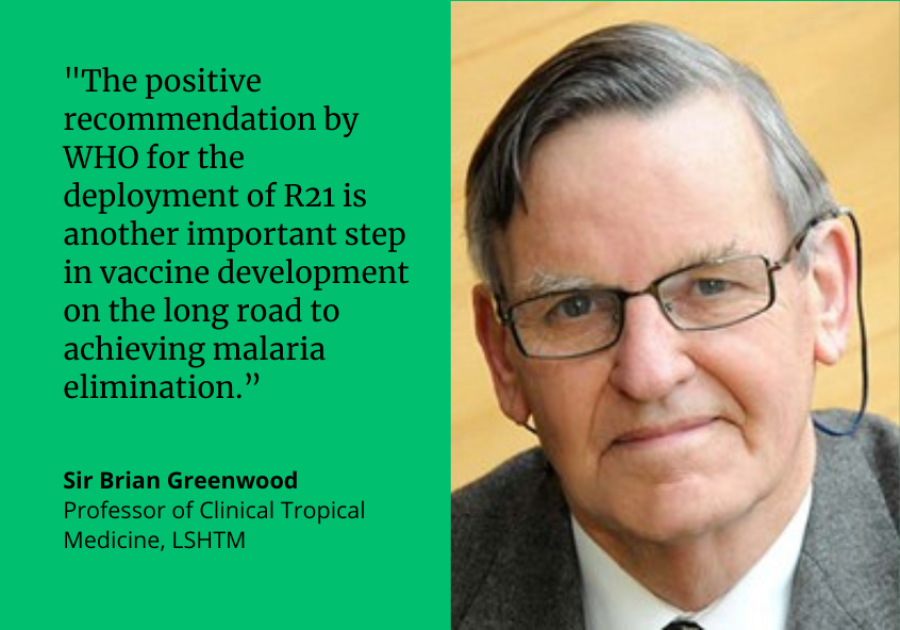Expert Comment – R21 malaria vaccine receives WHO recommendation
3 October 2023 London School of Hygiene & Tropical Medicine London School of Hygiene & Tropical Medicine https://lshtm.ac.uk/themes/custom/lshtm/images/lshtm-logo-black.png
"The positive recommendation by WHO for the deployment of R21 is another important step in malaria vaccine development on the long road to achieving malaria elimination." Sir Brian Greenwood, Professor of Clinical Tropical Medicine, LSHTM
The R21/Matrix-M™ vaccine, developed by researchers at the University of Oxford and the Serum Institute of India, is now a recommended vaccine against malaria infection, according to an announcement made by the World Health Organization (WHO).
R21 is the second malaria vaccine to be recommended for global use, following in the footsteps of the RTS,S vaccine evaluated by researchers at the London School of Hygiene & Tropical Medicine (LSHTM) and manufactured by GSK.
Both the RTS,S and R21 vaccines induce an immune response to the same circumsporozoite protein antigen found on the surface of the Plasmodium falciparum sporozoite, the stage of the parasite injected by a mosquito.
Sir Brian Greenwood, Professor of Clinical Tropical Medicine at LSHTM, who has paved the way in malaria research with his contributions to the development of the RTS,S vaccine, said:
“The wait for an effective malaria vaccine has been a long one and it was only in October 2021 that WHO recommended deployment of the world’s first malaria vaccine RTS,S. Now, two years later, a second malaria vaccine, R21, has also been approved by WHO.
“No direct comparison of the two vaccines has been done, but it is likely that the level and duration of protection that each provides are similar, as they both induce a comparable immune response to their target antigen on the surface of the Plasmodium falciparum parasite.
“The manufacture and deployment of two similar malaria vaccines is not redundant. Restriction of vaccine production at a single site, or by a single company, carries a risk of interrupted supply should there be an unanticipated external event and further research will still be needed to study the long-term safety of R21. Production of the R21 vaccine is likely to be cheaper then RTS,S, which will help improve the reach of vaccination.
“Neither RTS,S or R21 is a perfect vaccine and research must continue to develop vaccines which provide a higher and more persistent duration of protection against P. falciparum and also to develop vaccines which protect against P. vivax.
“The positive recommendation by WHO for the deployment of R21 is another important step in malaria vaccine development on the long road to achieving malaria elimination and congratulations are warranted for the many people whose initiative and hard work has made this possible.”
Dr Sam Wassmer, Co-Director of LSHTM’s Malaria Centre, who leads an international team of researchers developing new diagnostic tools and therapeutic approaches for malaria patients, added:
“This addition to our arsenal against the malaria parasite is going to be vital in our fight against the disease and will allow wider access to vaccines across the African continent."
Professor Umberto D'Alessandro, Director of the MRC Unit, The Gambia, LSHTM, who has been involved in malaria research since 1990 and now leads their work on disease control and elimination, said:
"The availability of a second malaria vaccine, R21, recommended for use by the World Health Organization represents a historical milestone in the fight against malaria. This is particularly welcome given that the progress in malaria control has recently stalled.
"Malaria vaccines are additional tools that can be used together with other control interventions to further decrease the malaria burden. Our MRC Unit at The Gambia has been contributing to the research on malaria vaccines and is currently investigating the impact of large-scale vaccinations on the transmission of malaria.
"Our goal is to save lives and improve the health of all those living in malaria-prone regions."
If you enjoyed this article and would like to build a career in global health, we offer a range of MSc programmes covering health and data, infectious and tropical diseases, population health, and public health and policy.
Available on campus or online, including flexible study that works around your work and home life, be part of a global community at the UK's no.1 public health university.